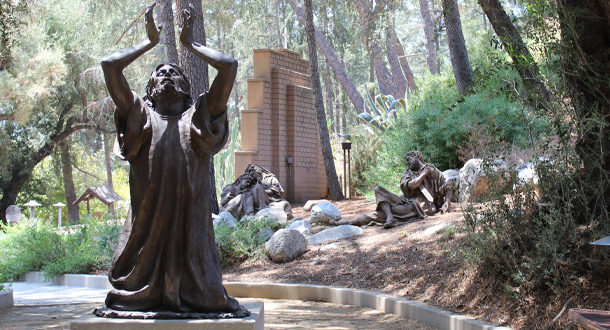
Palm Sunday of the Lord’s Passion
Scripture:
Luke 19:28-40
Isaiah 50:4-7
Philippians 2:6-11
Luke 22:14-23:56 or 23:1-49
Reflection:
On this Palm Sunday of the Lord’s Passion, the Gospel of Saint Luke proclaimed. Several elements unique to Luke demonstrate his distinctive style of presenting Jesus as Messiah—God’s anointed. Jesus is the one who has come to bring glad tidings, proclaim liberty to captives, sight to the blind, and freedom for the oppressed (4:16-21) frames the narrative throughout the Gospel.
Jesus’ role as teacher and prophet is highlighted by adding a farewell discourse to the Passover meal—instructing his apostles on what to expect when he is no longer with them. One might say that this Gospel sheds the apostles in a kinder light. For example, following Peter’s declaration never to abandon him, Jesus responds with, “You will deny three times that you know me” (Lk 22:34), not an outright declaration of denial of Jesus (Mk 14:30).
He doesn’t need his disciples to keep him company or pray with him on the Mount of Olives, he suggests they pray for themselves, addressing them only once as they slept. Although Luke is keen to portray Jesus’ very real anxiety as he “sweats drops as if blood” (v.44) in coming to accept his impending betrayal and suffering. Absent from the other synoptics Luke has Jesus make eye contact with Peter following Peter’s denial of him. There seems to be no sense of condemnation in the exchange.
Jesus forgives his executioners from the cross even as they mock him, but to the criminal who responded in faith, he promised a place in paradise. Absent from the cross is any frantic cry of desolation like “My God, why have you forsaken me” (Mk 15:35-37; Matt27:46-49). Jesus’ last words are “Into your hands, I commend my spirit” (Ps 30:6). While this Psalm portrays equally the rejection of the righteous one by enemies, it offers a quiet confidence in God’s saving power ending with, “have courage and let your hearts take strength, all you who hope in the Lord” (Ps 30:25).
The first reading from the prophet Isaiah and the second reading from Philippians blend beautifully with Luke’s Passion narrative. Commonly known as the third servant song, Isaiah details the Lord’s commissioning in preparing the prophet to “speak to the weary a word that will rouse them” (50:4). This was Jesus’ prophetic message—his training—his mission. However, Jesus was no ordinary prophet, he was the Son of God. The early Christians struggled to find words to express this incredible distinction. Reflecting the desire to create a fitting language, the text in Philippians is believed to be an old hymn sung at liturgies in praise of Jesus Christ.
In Luke’s passion narrative, Jesus’ actions are the primary focus. The reader’s attention is not as distracted by betrayals, denials, or political-religious manipulations. While Luke doesn’t deny the presence of those elements, Jesus’ actions are elevated in such a way that the rest fades into the background. Luke’s Jesus died as he lived. He accomplished what he came to fulfill.
May we enter into Holy Week filled with gratitude for the unspeakable gift of Jesus our Savior, finding hope and strength for our times. May peace reign in our hearts. Amen.
Jean Bowler is a member of the Ministry Team at Mater Dolorosa Passionist Retreat Center in Sierra Madre, California.
